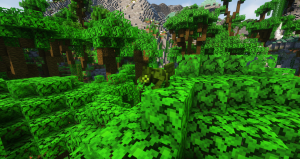Chameleon: Difference between revisions
No edit summary |
No edit summary |
||
| Line 49: | Line 49: | ||
== Abilities == | == Abilities == | ||
''' | '''Camouflage''':A chameleon can camouflage itself in foliage to avoid being seen. When approaching a chameleon, an Intelligence roll of at least 10 is required to see it. | ||
''' | '''Harmless''': A Chameleon does not have any attacks | ||
==Drops== | ==Drops== | ||
Revision as of 21:07, 12 December 2023
| Class | Reptile |
| Rarity | Rare |
| Size | Tiny |
| Stats |
2 HP 2 Strength 4 Defense 8 Agility 2 Intelligence |
Description
Chameleons belong to the family of lizards, iguanas to be more specific.
They have some very unique features that are not common in the animal world. For example, they have a very long and muscular tongue, special eyes, uncommon legs and they can change color. In this way they are easy to distinguish from their peers. Chameleons can also be recognized by their characteristic build.
They also have a body that is flattened on the side, legs that consist of 2 toes, a fairly thick tail that can be used to grab things and that can be rolled up, a specially built head with fairly large eyes that bulge out and a tongue that has the ability to shoot fast and far out.
The head and eyes of the chameleon stand out because they are different from normal. For example, the eyes bulge out a lot and they rotate. The head of the chameleon is special in that it touches a kind of thorn or comb. Many of these characteristics help them live in trees and shrubs.
A chameleon can hunt prey with its eyes and tongue. This is also possible if it hangs in a tree, for example. Another thing that makes a chameleon different from other lizard species is the fact that they don't have a crease behind their heads.
This is common in many lizard species. Another difference between chameleons and other lizards is the length. Chameleons differ in length, for example. Lizards are generally quite small, chameleons, on the other hand, can grow up to 65 cm in length. Some species can grow even larger.
Chameleons are also known for the ability to change the color of their skin. They do this by redistributing the pigments in their body over the body. Changing color is mainly used for communication and camouflage.
Habitat
Burial pits, crypts, catacombs or cemeteries.
Behaviour
When a chameleon spots prey, it turns its head to determine the location of the prey.
Then he focuses both eyes on the prey for a better view. With these eyes they can see depth and determine the distance of the prey. This allows them, for example, to aim easily and accurately when using their shooting tongue on prey. The chameleon approaches its prey by making a kind of rocking movement with its body.
The reason they do this is not only to approach the prey as inconspicuously as possible, but it also helps them determine the distance between the prey and themselves. Then the chameleon opens its mouth and its tongue is shot off with the strong muscles attached to the tongue.
The prey then sticks to the tip of the tongue, which is equipped with a kind of suction cup. After the tongue is fully extended, it is pulled back into the mouth by a muscle in the mouth that contracts. The tongue can only be used under the condition that it must be moist. Grabbing wet prey such as slugs or earthworms is therefore not possible.
They do this mainly during their most active times of the day, namely just after sunrise and just before sunset. At the time of the day when the temperature is highest, they look for a place to hide.
Communication
Chameleons make great use of communication. They do this, for example, by making rhythmic movements. For example, by nodding the head or by making movements with the legs. They also communicate by giving signals with the color of their body and by creating vibrations. They can perceive these vibrations well.
Food & hunting
From a hiding place, the chameleon looks down at a prey. Here it remains still until the prey comes close enough to grab it with its tongue. When a chameleon is really hungry, it deviates from this strategy to really look for food.
They are known to eat meat, but sometimes vegetable things are also eaten, for example fruit. The smaller species, on the other hand, mainly eat insects. The large species basically just eat whatever they find.
Abilities
Camouflage:A chameleon can camouflage itself in foliage to avoid being seen. When approaching a chameleon, an Intelligence roll of at least 10 is required to see it.
Harmless: A Chameleon does not have any attacks
Drops
Chameleon meat and tail
